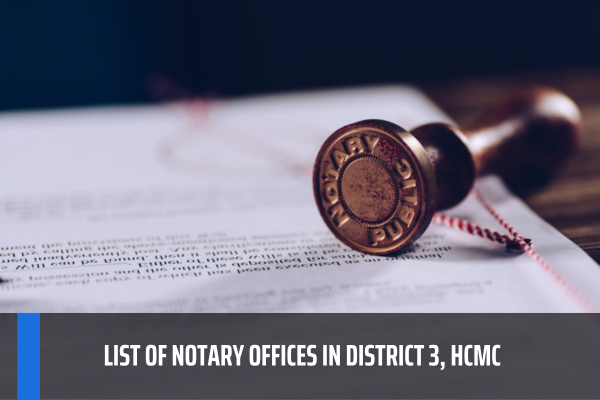What is the List of notary offices in District 3, HCMC? What are the the differences between a notary bureau and a notary office in Vietnam?
What is the List of notary offices in District 3, HCMC?
Currently, in Ho Chi Minh City, there are many notary bureaus and notary offices operating and providing legal services.
You can refer to some notary offices in District 3 (referred to as District 3 notary office) as follows:
Van Thi My Duc Notary Office
Address: 47E Nguyen Thong, Ward 9, District 3, HCMC.
Asia Notary Office
Address: 44 Vo Van Tan, Vo Thi Sau Ward, District 3, HCMC.
Nguyen Thanh Hung Notary Office
Address: No. 4 Tran Quang Dieu, Ward 13, District 3, HCMC
Above is reference information about some notary offices in District 3.

What is the List of notary offices in District 3, HCMC? (Image from the Internet)
What are the the differences between notary bureaus and a notary offices in Vietnam?
Pursuant to the provisions of Article 19 of the Law on Notarization 2014, there is the following content:
Notary bureaus
1. Notary bureaus shall be established under decisions of provincial-level People’s Committees.
2. Notary bureaus are public non-business units attached to provincial-level Justice Departments, and have their own offices, seals and accounts.
The at-law representative of a notary bureau is the head of such notary bureau. Heads of notary bureaus must be notaries and shall be appointed, relieved from duty and dismissed by chairpersons of provincial-level People’s Committees.
3. The name of a notary bureau must contain the words “notary bureau” followed by the ordinal number of its establishment and the name of the province or centrally run city where it is established.
4. Notary bureaus shall use seals bearing no national emblem. Notary bureaus may have their seals carved and use them after obtaining establishment decisions. Procedures and dossiers of request for seal carving and management and use of seals by notary bureaus must comply with the law on seals.
In Article 22 of the Law on Notarization 2014, amended in Clause 9, Article 73 of the Law on Prices 2023, regulations on notary offices are as follows:
Notary offices
1. Notary offices shall be organized and operate in accordance with this Law and other relevant legal documents concerning partnerships.
A notary office must have at least 2 notaries being its partners. Notary offices have no capital contributors.
2. The at-law representative of a notary office shall act as its head. The head of a notary office must be a notary who is its partner and has practiced notarization for at least 2 years.
3. The name of a notary office must contain the words “notary office” followed by the full name of its head or another notary being its partner as agreed by all notaries who are partners, and must not be identical to or cause confusion with those of other notarial practice organizations and violate national historical and cultural traditions, ethics and fine customs.
4. Notary offices must have head offices satisfying the conditions prescribed by the Government.
Notary offices may have their own seals and accounts and shall operate on the principle of financial autonomy with their revenues coming from notarization charges, notarization prices for on-demand notarization-related services and other lawful sources.
5. Notary offices shall use seals bearing no national emblem. Notary offices may have their seals carved and use them after obtaining establishment permission decisions. Procedures and dossiers of request for permission for seal carving and management and use of seals of notary offices must comply with the law on seals.
Thus, comparing the two regulations above, we can see that there are many certain differences between notary offices and notary offices. However, we can rely on the following outstanding differences to distinguish notary offices and notary offices:
(1) Regarding subject:
Notary bureaus shall be established under decisions of provincial-level People’s Committees.
Notary offices shall be organized and operate in accordance with this Law and other relevant legal documents concerning partnerships.
(2) Regarding name:
The name of a notary bureau must contain the words “notary bureau” followed by the ordinal number of its establishment and the name of the province or centrally run city where it is established.
The name of a notary office must contain the words “notary office” followed by the full name of its head or another notary being its partner as agreed by all notaries who are partners, and must not be identical to or cause confusion with those of other notarial practice organizations and violate national historical and cultural traditions, ethics and fine customs.
How are the rights of notarial practice organizations in Vietnam?
Pursuant to the provisions of Article 32 of the Law on Notarization 2014, amended in Clause 9, Article 73 of the Law on Prices 2023, there are regulations on the rights of notarial practice organizations as follows:
- To sign employment contracts or labor contracts with notaries prescribed at Points a and c, Clause 1, Article 34 of the Law on Notarization 2014 and other employees.
- To collect notarization charges, notarization prices for on-demand notarization-related services and other expenses.
- To provide notarization services beyond the working hours applicable to state administrative agencies to meet people’s notarization demands.
- To exploit and use information from the notarization database prescribed in Article 62 of the Law on Notarization 2014.
- To exercise other rights as prescribed by the Law on Notarization 2014 and other relevant legal documents.
Law on Prices 2023 will take effect from July 1, 2024
LawNet